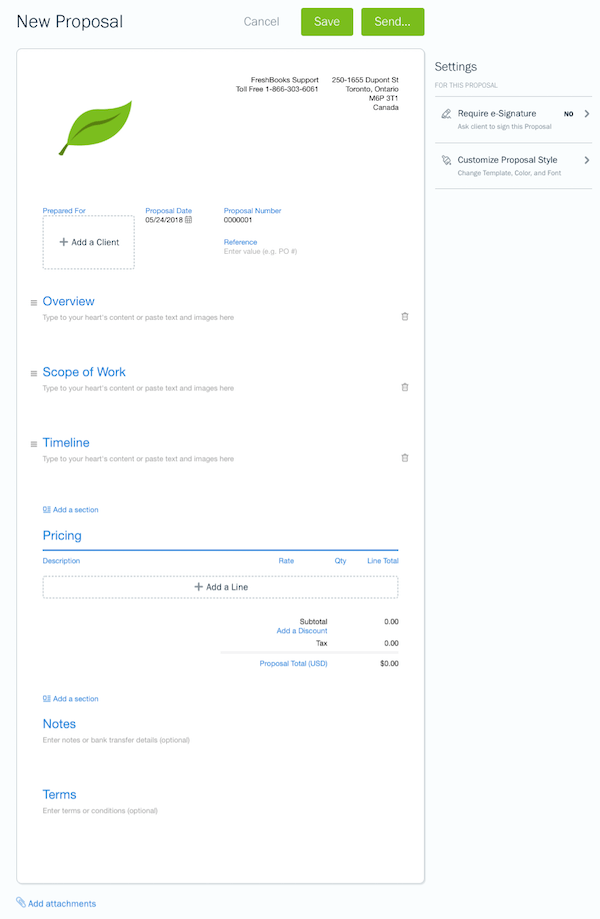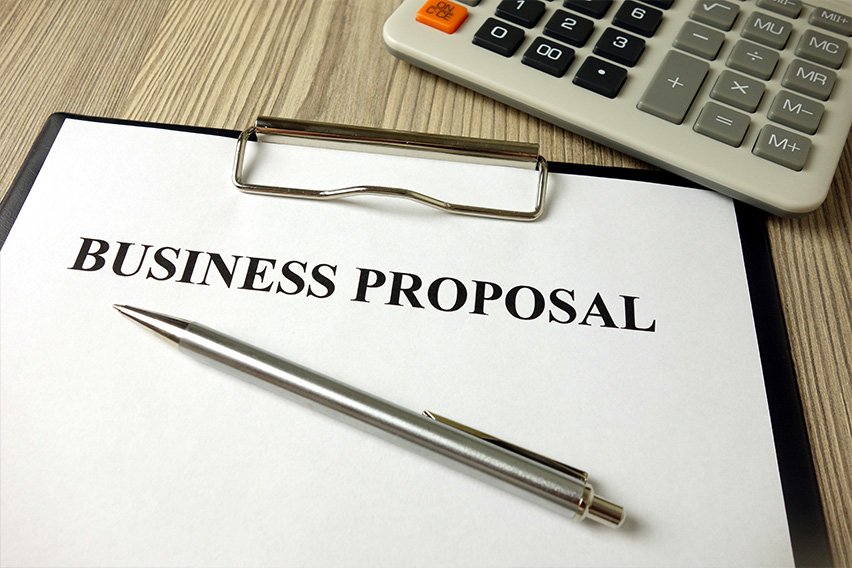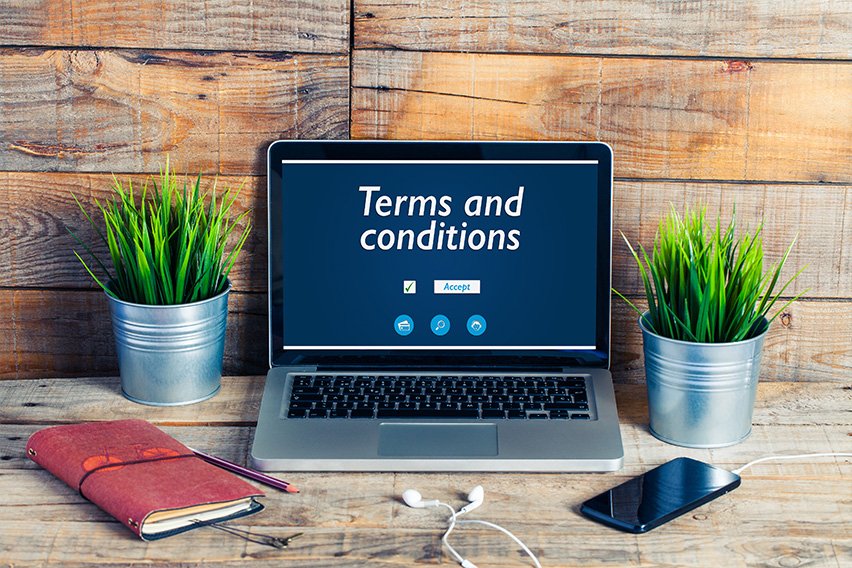What Is a Business Proposal? A Simple Definition for Small Businesses

A business proposal is sent from a supplier to a potential client for the purpose of winning a specific project. It is a written document and it can either be requested by the client or sent unsolicited. Many service-based small businesses rely on proposals in order to sell their services and bring in new work, according to Inc..
In this article, we’ll cover:
What Is a Business Proposal?
The definition of a business proposal is a document in writing sent by a supplier to a potential client in hopes of winning a project.
At heart, it is a sales document that includes all the standard information found in similar documents like estimates, bids and quotes.

This standard content includes:
- Scope (what the project does and doesn’t include)
- What the business promises to deliver (services or products)
- Costs
- Completion date and timelines
But a proposal is more detailed because it’s typically used to win complicated or unique jobs, according to Inc..
- For example, a proposal might be used to win a complex residential landscaping job. Or a customer wants a marketing firm to provide a detailed report on their target market.
Also, proposals are specific in what they promise—they don’t provide approximate pricing and believed scope like estimates do.
Below is an example of what a proposal template looks like in FreshBooks. This template has many of the key elements that go into the typical proposal.

Source: FreshBooks
Requested vs. Unsolicited Proposals
A client may specifically request a proposal. They can ask for one casually in conversation, request one via email or send a formal “request for proposal” (or “RFP”) document.
A RFP specifically outlines what product or services they want and when they want the proposal back. They may also invite the business to offer unique solutions to complete the project.
An RFP means that the potential client is in a buying mood and is actively looking to select a supplier. Your job is to write a proposal that helps them choose you by showing you understand their requirements and can provide unique solutions.
A business can also send a potential client a proposal without the client requesting one. In this sense, a proposal is more like a sales presentation.
- For example, a nutritionist can submit a book proposal to a publisher on the keto diet. The proposal outlines the popularity of the keto diet, the nutritionist’s professional qualifications and previous writing experience and how the book will be different (and better) than existing books about the keto diet.
Ready to create your own business proposal? FreshBooks has cloud-based proposal software that makes creating and sending winning proposals easy.
If you want to learn more first about how to create a business proposal, this article delivers a business proposal outline and format ideas plus proposal templates you can download for free.
What Is a Business Proposal Letter?
A business proposal letter (or “cover letter”) is part of a business proposal, according to Inc..
A business proposal typically has two parts:
- Cover letter
- Proposal document
A shorter proposal may combine these two parts into a six to eight page document.
A cover letter helps provide context on why you’re sending the attached proposal.
A cover letter (or “transmittal document”) should be brief. One page is ideal, according to the Houston Chronicle. Two pages is the maximum length. After all, the proposal document itself is most important than the cover letter.
A cover letter should also be in standard business letter format and you can write it in first person (using “I”).
A cover letter can include the following content:
- Cite when and under what circumstances the proposal was requested by the client
- Credit anyone who helped prepare the proposal
- A summary of the proposal (an “executive summary”)
- Thank the potential client
- Include your contact information
- Ask the client to contact you with any questions
As for circumstances, you can mention the client’s request for proposal document (RFP) and what date it was sent. Or you can refer to a past conversation where the potential client expressed interest in seeing a proposal about a project.
A cover letter is also useful if the proposal contains any surprises, such as:
- The proposal contains anything different than what was originally agreed upon, such as project scope or cost
- Problems that will affect the project that came to light after your last conversation with the client
FreshBooks lets you attach documents to your proposal, making it easy to include a cover letter and send the entire proposal package to your client.
Looking for a template for your cover letter? Here are a couple samples:
- A simple business letter Word template from MS Office
- A detailed business proposal letter template, you can also download it for Word
- A business proposal letter template for the construction industry
People also ask:
- What Is the Difference Between a Proposal and an Estimate?
- What Is the Purpose of a Business Proposal?
- What Are the Types of Business Proposals?
What Is the Difference Between a Proposal and an Estimate?
Proposals and estimates are both sales documents that a business uses to try to win a project. But, proposals are much more detailed than estimates and usually cover more complex projects, according to Inc..
Proposals also explain the value a company will provide to a potential client and list its past projects or include client testimonials.
Some small businesses use estimates to detail the costs and tasks a project will involve. Then, instead of drawing up a formal proposal they prove their value through other means—usually during a call or on a site visit.
Or the business doesn’t have to prove their value because they have a great reputation and the client is already sure they’re the best fit for the job. Maybe the potential client got a referral from a trusted friend. Or they read good reviews online. In these cases, the job is usually not overly complex or unique.
If a job is complicated or has very specific requirements, more proof is required that a business is the right fit for a job. A proposal is needed to prove that the supplier can provide the right schedule, design, approach, aesthetics and more.

What Is the Purpose of a Business Proposal?
The purpose of a business proposal is to win a new project, often with a new client where there isn’t an established business relationship. Leveraging advanced proposal software in the creation of your proposal becomes crucial in this competitive landscape.
A business’s proposal is often in competition with proposals from competitors. So the purpose of a proposal is also to differentiate you from your competition and demonstrate the value you’ll provide the prospective client.
Value could include demonstrating how you’ll save your prospective client time or money or even help them make more money.
Often testimonials and examples of past projects are included to showcase your reputation and what your business is capable of doing. This type of proof helps build trust with your potential client.
- For example, a construction company could include health and safety documents.
What Are the Types of Business Proposals?
Business proposals have different formats specific to different industries, according to Inc.. Most service-based businesses can follow a general proposal format, though there are exceptions.
Exceptions include:
- Trades (like electric wiring)
- Architecture and landscaping
- Advertising
Trades will want to find old proposals in their field and copy the format. In landscaping and architecture, a model may be required as well as a visual presentation. Advertising proposals will probably need a presentation as well.
In all the industries listed above, a meeting is usually crucial to make the sale. It also gives the business a chance to deliver their visual presentation. The written business proposal isn’t a key part of their marketing, though it is useful to sum up the presentation (an “executive summary”), reiterate why their company is the best choice for the job and include any important administrative notes.
RELATED ARTICLES

 7 Simple Steps to Write a Business Proposal | A Guide for Small Businesses
7 Simple Steps to Write a Business Proposal | A Guide for Small Businesses Create a Quote in 8 Simple Steps: A Guide for Small Businesses
Create a Quote in 8 Simple Steps: A Guide for Small Businesses How Can You Convert an Estimate to an Invoice
How Can You Convert an Estimate to an Invoice 5 Estimate Terms and Conditions for Your Small Business
5 Estimate Terms and Conditions for Your Small Business How To Price Moving Jobs: A Pricing Guide for Small Businesses
How To Price Moving Jobs: A Pricing Guide for Small Businesses